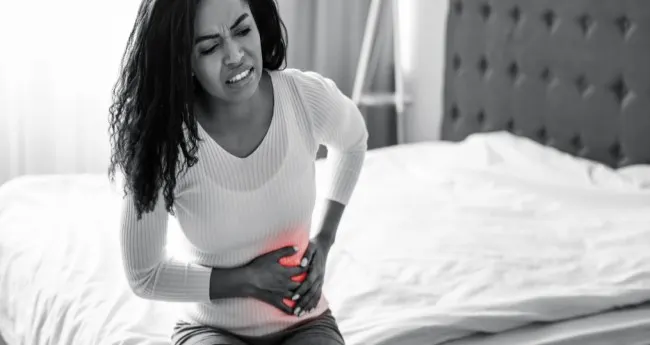PCOS and Endometriosis – How to differentiate?

Polycystic ovarian syndrome (PCOS) and endometriosis are two different conditions that affect the women in their childbearing years. Both conditions are hormonal and lead to menstrual issues such as heavy bleeding, irregular periods, and difficulty in getting pregnant. These overlapping symptoms can make it difficult to tell the difference between PCOS and endometriosis. You may wonder, ‘How do I know if I have endometriosis or PCOS?’
The answer is that other than heavy bleeding and difficulty in getting pregnant, their other symptoms are quite different. That’s because they are related to different hormones. Endometriosis is related to an excess of oestrogen, while PCOS is linked to excess androgens.
With symptoms such as heavy bleeding and irregular periods, it is important to not only be prepared by always having sanitary pads with you, but also have them of supreme quality such as Always pads. The Always Maxi Thick pads are a perfect fit. They are designed with unique anti-leakage barriers in the front, centre, and back to provide maximum coverage. It has an extra absorbent core that is designed to absorb liquid, so you don't feel a thing.

Let’s understand PCOS and endometriosis in detail and know their differences.
What is PCOS?
Your ovaries have several important functions, the primary one being the release of reproductive hormones. The growth and release of an egg from the ovary, also known as ovulation, depends on those reproductive hormones.
PCOS is a condition that is the result of your ovaries and adrenal glands producing too much of the hormone, androgen. In addition, cysts or sacs filled with fluid also form in the ovaries of most people who have PCOS. Below are some of its symptoms:
- Irregular or missed periods
- High levels of androgens
- Development of cysts in one or both ovaries.

Here are the common causes of PCOS.
1. Disproportionate hormones
When any one hormone is in excess, for instance high levels of testosterone, it could contribute to PCOS.2. Resistance to insulin
If your insulin levels are high due to your body being unable to effectively use it, it could result in excessive production of the male hormone, androgen. This could lead to PCOS.3. Inflammation
When you have an infection or an injury, your white blood cells make substances in response to it. This response is called low-grade inflammation. When you experience excess inflammation, it can also lead to high levels of male hormones, leading to PCOS.What is endometriosis?
The endometrium is the innermost lining of the uterus. It is responsible for the proper functioning of the uterus, especially during pregnancy. However, with endometriosis, the endometrial tissue begins to grow outside the uterus. This condition occurs when estradiol, a type of estrogen, is produced in excess. High levels of estradiol are responsible for abnormal uterine tissue growth. This tissue may thicken and bleed during your menstrual cycle. This could lead to:
- Intense pain in the pelvic region
- Inflammation
- Infertility
- Heavy periods
- Painful periods.
Here are some of the other causes of endometriosis.
1. Retrograde menstruation
When menstrual blood, containing endometrial cells, flow back through the fallopian tubes and into the pelvic cavity instead of out of the body, it is called retrograde menstruation. These endometrial cells latch on to the pelvic walls and surfaces of pelvic organs. Once attached, they grow and continue to thicken and bleed over the course of each menstrual cycle.2. Immune system problems
Typically, nearly all women who menstruate are affected by retrograde menstruation. And usually, the immune system manages it. However, if you have issues with the immune system, it may make the body unable to recognise and destroy endometrial-like tissue that's growing outside the uterus, causing endometriosis.3. Post-surgery implantation
Certain surgeries, like a hysterectomy, can lead to endometrial cells implanting themselves at the surgical site.Difference between PCOS and endometriosis
In order to have a clear distinction between the symptoms of PCOS and endometriosis, below is a table that has an extensive list of both.
| Factors | Endometriosis | PCOS |
|---|---|---|
| Causes | Retrograde menstruation | Abnormal hormone levels |
| Immune system problems | ||
| Post-surgery implantation | ||
| Symptoms | Heavy periods | Heavy and long periods |
| Infertility | Infertility | |
| Constipation | Having excess body and facial hair | |
| Frequent urination | Fluid-filled sacs called cysts in the ovaries | |
| Pain in the abdomen | Irregular menstrual cycles | |
| Severe and chronic pain in the pelvic area | Male-pattern baldness | |
| Painful bowel movements | Masculine features | |
| Painful periods | Obesity | |
| Painful intercourse | Severe acne | |
| Painful urination | Diabetes and insulin resistance | |
| Rectal bleeding | ||
| Urinary urgency |

Can you have both PCOS and endometriosis?
Because both are hormone-related conditions, the symptoms may seem similar, and it could get confusing to differentiate between PCOS and endometriosis. But if you have symptoms of both the conditions, one may wonder, ‘Can you have PCOS and endometriosis at the same time?
The answer is that although rare, it is possible to have both PCOS and endometriosis. This is true especially during a heavy period when there are higher chances of retrograde menstruation.
How to diagnose PCOS and endometriosis?
Your doctor would use the below tests to diagnose your condition if you have the symptoms. These tests and data include:
For endometriosis
- You will be asked about your medical history such as any pre-existing conditions and if you have relatives with endometriosis.
- A pelvic exam can help check for scars.
- Ultrasound or an MRI helps produce detailed images of your organs.
- To identify any abnormal levels of inflammatory markers and hormones, blood tests are conducted.
- Some may undergo a laparoscopy, wherein a surgeon creates a small incision and checks for abnormal tissue growth.
For PCOS
- Checking your family history and health status can help determine if PCOS is a possible cause.
- A pelvic exam helps identify cysts and other growths.
- An ultrasound can be done to detect any abnormalities.
- Blood tests help find out if hormonal levels of inflammatory markers are abnormal, which could indicate PCOS.
There are many forms of medications that are available to treat both the conditions.
For endometriosis
The treatment primarily helps in reducing estrogen and pain. They are:- Medication such as birth control can help reduce levels of estrogen and regulate growth of endometrial tissue.
- Certain over-the-counter pain medication may help find relief. Do note that you must always take any medication after consulting with a doctor.
- If there is any endometrial tissue growth then a surgery can help get rid of it.
- Some may be recommended to have a surgical intervention. Consult your doctor, who is best suited to guide you, for the best way ahead depending on the severity of your condition.
- A healthy, balanced, and nutritious diet can help manage symptoms.
For PCOS
The treatment for PCOS focuses on inducing ovulation and decreasing androgens. Treatments include:- For those who are trying to conceive, certain medication can trigger ovulation. Else, birth control or diabetes medication can help reduce androgen levels. Always consult your doctor before taking any kind of medication.
- A common symptom of PCOS is acne or excessive hair growth. Certain drugs help manage acne or excess hair growth. Ensure that the medication you take is prescribed by a doctor after thorough examination.
- Controlling your weight with the help of a nutritious diet and regular exercise could help lose weight, which may help manage your symptoms better.
Does PCOS or endometriosis affect pregnancy?
If you have either of the conditions and want to become a parent, it’s only natural to ask the question, ‘Can you get pregnant with endometriosis or PCOS?’ The simple answer is yes, you can conceive, it may not be as easy, but it is very much possible. However, it is also true that PCOS or endometriosis can cause issues during pregnancy. But the condition may differ for every woman and you probably need to be extra careful.
With PCOS, there is an increased risk of diabetes and high blood pressure during pregnancy. This is because it’s a hormonal condition and one of its common causes is linked to insulin resistance. So, it is bound to cause other changes to your body as well.
Whereas those who have endometriosis and are pregnant are more likely to have a preterm birth. Preterm birth is when the baby arrives before 37 weeks of pregnancy. This makes it imperative to be super vigilant about experiencing any labour-like symptoms such as contractions or pelvic discomfort.
Another endometriosis-linked pregnancy complication is placenta previa. This happens when the placenta, which is typically located near the uterine walls, is located near the opening of the cervix. This increases the risk of blood loss or a ruptured placenta, which is a serious condition requiring immediate medical help.

It’s important to note that not every pregnant woman with PCOS or endometriosis will face the above issues. However, there are chances of them happening, which makes it crucial to consult your doctor and have a plan in place to manage any associated risks.
Takeaway
We understand that it can get difficult and infuriating to manage endometriosis and PCOS. It’s a good thing that it’s rare for both to occur at the same time. Even having any one of the conditions can have a negative impact on your life. However, by leading a healthy lifestyle and having a sense of well-being can help alleviate the symptoms of endometriosis and PCOS.
Stay well prepared for your next period by tracking it on Always Period Calculator
Disclaimer:
Please note the date of last review or update on all articles. No content on this site, regardless of date, should ever be used as a substitute for direct medical advice, diagnosis or treatment from your doctor or other qualified clinician. Always is committed to ensuring that all of our products meet rigorous safety standards; Always pads prioritize safety, protection and comfort of its consumers.




